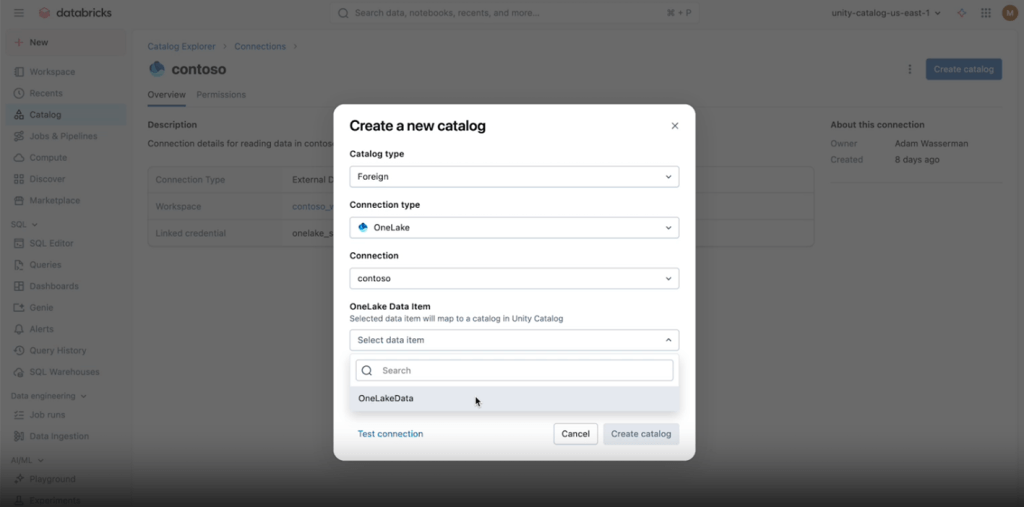Expanding support for OneLake in Unity Catalog
Deepening interoperability through open standards

Summary
- All data managed by Azure Databricks Unity Catalog is accessible by OneLake today
- Microsoft added Unity Catalog Open API support in OneLake
- Databricks will be able to read from OneLake soon
Today marks an important milestone for open standards and the broader data community. We are working with Microsoft to integrate the data managed both in Unity Catalog and OneLake using open standards. The Unity Catalog Open API specification provides an interface to exchange data both ways, zero copy, to open up access to the entire lakehouse ecosystem for engines in either platform.
For nearly a decade, Databricks and Microsoft have partnered to help organizations unlock the value of their data through the openness and flexibility of the lakehouse. Today, that partnership takes another step forward, giving customers more choice in how they access and govern data across platforms.
The Path to Open Interoperability
As open table formats like Delta Lake and Iceberg gained adoption, new silos emerged at the catalog-level. To address this, Databricks launched Unity Catalog Open APIs, establishing an open standard for unified governance across data and AI, while also fully supporting the Iceberg REST catalog API for tabular data. This dual-API approach empowers organizations to adopt best-in-class solutions and avoid vendor lock-in while seamlessly sharing data across many data platforms and SaaS Applications. We also introduced catalog federation to provide a single governed view across all data platforms. This model, open APIs powering catalog federation, has become the industry standard for interoperability.
Today, we’re excited to see this open vision validated by our partners at Microsoft.
Microsoft adds support for Unity Catalog Open APIs
As we announced with our partners at Microsoft today, our collaboration is deepening.
Microsoft has already added support for reading from Azure Databricks with OneLake Mirroring, allowing Fabric engines to access all of the data managed in Unity Catalog seamlessly. Unlike other OneLake integrations with proprietary platforms, this makes all data in Unity Catalog - including the highest performance tables - available in OneLake without copying, changing code, or additional costs.
Today, Microsoft and Databricks are extending their openness by integrating even more natively. With Microsoft OneLake adding support for the Unity Catalog Open API standard, Azure Databricks users will be able to seamlessly read data from OneLake.
With OneLake adding support for open catalog APIs including Iceberg REST and Unity Catalog Open APIs, Microsoft is making OneLake structured and unstructured data from services like Dynamics, Dataverse, Blob store, etc. natively accessible to the entire open lakehouse ecosystem, including Databricks.
Gartner®: Databricks Cloud Database Leader

Databricks Builds on the Open Foundation
Leveraging this expanded capability, Databricks is adding support to make all OneLake data seamlessly available in Unity Catalog.
This enables zero-copy reading of OneLake data from within Databricks ensuring seamless interoperability and access across both platforms, giving Databricks customers access to all their data in the Microsoft ecosystem to power their most advanced AI, machine learning, and large-scale data engineering workloads.
Catalog Integration
- Reading from Unity Catalog in Fabric – Generally Available Now
Microsoft has released Azure Databricks mirroring. Customers can mirror Azure Databricks data into OneLake, through Unity Catalog ensuring that ALL data managed by Azure Databricks is instantly available across Microsoft Fabric workloads. Both platforms can work over the same copy of data with no data movement. - Reading from OneLake in Azure Databricks - EOY 2025
This new capability, enables Azure Databricks to read data from OneLake via their Unity Catalog Open APIs and allows all of your OneLake data to be leveraged seamlessly in Databricks. Customers can create Unity Catalog Connections to OneLake based on Managed Identities from EntraID, and can seamlessly mount data items from any Fabric workspace, directly as a catalog in Unity.

Connecting to OneLake data in Azure Databricks
The Future is Open
This milestone reflects how far the industry has come toward an open, interoperable data ecosystem. Customers no longer need to choose between innovation and interoperability—they can have both.
With Microsoft now embracing the open catalog standard, we are excited to continue building the future of data and AI on this foundation. Stay tuned for more announcements and roadmap updates, including support for Azure Databricks writing data directly in OneLake, as we deepen our integration.
Never miss a Databricks post
Sign up
What's next?

Product
November 21, 2024/3 min read
